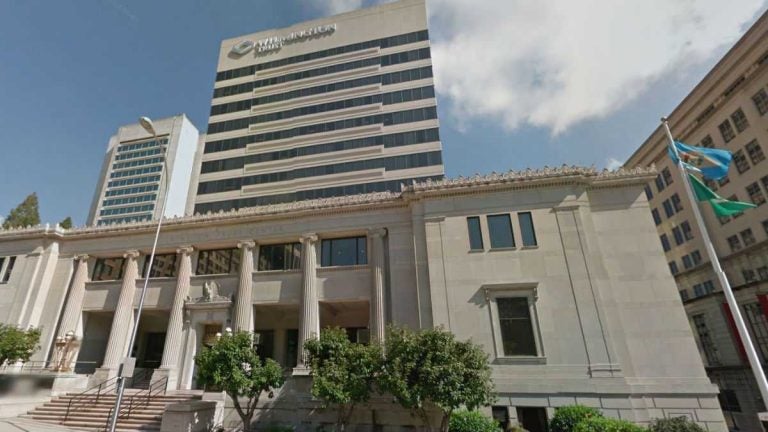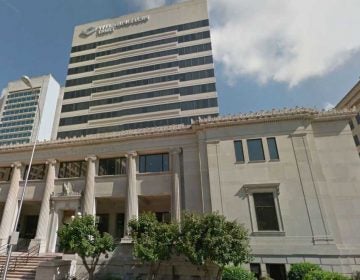Closing arguments begin in Wilmington Trust fraud trial
Robert Harra, David Gibson, William North and Kevyn Rakowski are accused of hiding millions in bad loans on the bank’s books

Six former officers of Wilmington Trust have been sentenced to prison for financial crimes. (image via Google Maps)
Closing arguments began Monday during the seventh week in the trial of four former Wilmington Trust executives accused of bank fraud.
Assistant U.S. Attorney Robert Kravetz argued financial documents and emails discussed throughout the trial prove the defendants were aware their practice of waiving and extending past-due loans was illegal — but continued their efforts to conceal the bank’s poor fiscal health.
“The evidence has shown beyond all reasonable doubt Wilmington Trust lied about past-due loans, they knew what they were doing was wrong — and the lie mattered,” he said. “It mattered because the public invested more than $280 million on that lie.”
Robert Harra, David Gibson, William North and Kevyn Rakowski are accused of hiding millions in bad loans on the bank’s books from the Federal Reserve, the Securities and Exchange Commission, and the public between October 2009 and November 2010.
Prosecutors claim the four schemed to hide the true volume of losses. By the end of 2009, the bank reported just $11 million in past-due loans while waiving more than $360 million worth, prosecutors allege. They contend the bank never disclosed its financial circumstances to investors.
In October, Wilmington Trust reached a $60 million deal with the U.S. attorney’s office to settle criminal charges against it.
As home builders and developers struggled to complete projects and sell homes during the economic crisis, commercial real estate loans became delinquent. In order to portray a solid loan portfolio, prosecutors said, the executives created two sets of books.
Auditors, the Federal Reserve and other outside parties warned Wilmington Trust it had significant problems in its loan portfolio, Kravetz said. The entities were so concerned, they downgraded the bank’s level of safety and soundness, requiring it to submit monthly reports of past-due loans.
Kravetz said the waiver practice started out as a “little white lie,” but, over time, it “snowballed” and the “little white lie” became the “matured loans beast.”
When the waiver practice became “overwhelming,” the defendants created a “mass extension process” of temporarily extending loans on a short-term basis, prosecutors say.
In less than two months, the bank allegedly extended about 800 loans worth more than $1.3 billion. Prosecutors argue some borrowers didn’t know their loans had been extended.
The defense argued the bank entered several oral agreements with borrowers. However, Kravetz said, documents and emails show the bank’s policy was to enter signed agreements with borrowers in order to extend matured loans.
“It’s an $11 billion bank — it’s not a lemonade stand,” he said.
Kravetz said emails between the defendants and other employees about the urgency to address past-due loans prove they were aware of the waiver and extension practices. He included an email from defendant Rakowski to defendant Gibson: “We did pull the waived loans from the past due report.”
Michael Kelly, attorney for defendant Harra, began his closing arguments Monday afternoon.
He argued the bank had waived loans for several years, and no one informed the defendants it was wrong.
“I didn’t hear anything in the five weeks of government testimony, I heard about concern, but I didn’t hear anything about, ‘Hey, don’t do this, it’s wrong, it’s the wrong way to report, this is not the way to do it.’
“I didn’t hear any evidence Harra knew what the regulations are,” Kelly said. “They had been reporting the same way for 28 years. Everybody knows about it. They’re disclosing it, they’re not hiding it.”
Kelly also placed blame on former loan officer Joseph Terranova who in 2013 pleaded guilty to conspiracy to commit bank fraud, and testified on behalf of prosecutors.
What’s more, Harra and the other defendants reported to bank CEO Ted Cecala, Kelly said.
The defense will continue its closing arguments Tuesday.
WHYY is your source for fact-based, in-depth journalism and information. As a nonprofit organization, we rely on financial support from readers like you. Please give today.




